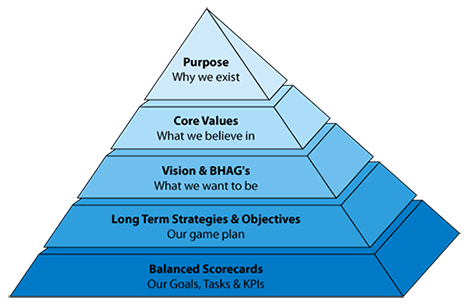Ask ten people for a definition of strategic planning and you will probably receive ten different answers. But most will agree that it is a way to identify long-term goals and to be used to guide your company towards fulfilling those goals.
In the big picture strategic planning involves:
- Assessing the current business environment.
- Defining your company’s Strategy Pyramid.
- Deciding what you want the business to look like in three to five years.
- Mapping out a course to take the company from its current to its desired position.
“But my business is small. Do I really need to develop a plan like this?”
“Only if you want to stay in business and prosper.”
Consider the following reasons for strategic planning.
- Technology and the fast pace of change are making business management more complex. Strategic planning will help you foresee and react quickly to market changes and opportunities and identify areas in which your business is lagging behind.
- Competition is becoming tougher. In most cases, small businesses find themselves competing with much larger companies — ones that know the benefits of strategic planning and practice it.
- Good financial control alone is not enough to ensure your business’s success. In addition to a budget, you need long-term goals to determine the future direction of your company.
- You can use strategic planning to involve employees in all areas of your business, so they share your goals.
- You can use your plan to communicate with bankers, who often do not understand the nature of your business. Bankers must be convinced that your company is in control of its future before they will lay their money on the line. A comprehensive plan aimed at sustained growth in sales and earnings can be very convincing.
Strategy Pyramid

Need help getting started, give us a call.
Have a Great Day.
Doug


Recent Comments